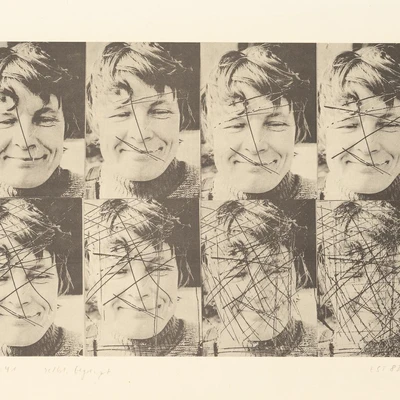Peter Dittrich
- * 1931
- † 2009
Life dates
- Artist
Category
Drawing Equals Thinking
1975 was a momentous year in Angolan history. Independence from the Portuguese had begun, but so did the country’s 27-year civil war. After the Movimento Popular de Libertação de Angola (MPLA), a socialist party backed by the Soviet Union, emerged as the new leader, the Frente Nacional de Libertação de Angola (FNLA), a second faction supported by the United States, mounted a military campaign to regain the country’s metropolitan areas. This proxy war, a snapshot in the Global Cold War, is the context of Peter Dittrich’s drawing Material Reserves in Angola. White henchmen, armed with FNLA gas canisters, try to ignite a city and then ridicule a Black MPLA solider, who extinguishes the flames with a shovel. The comic lampoons the infantile greed of foreign powers, who either forcefully extract raw materials from Africa or spitefully stoke local issues when those supply lines are revoked.
This is just one of the many stabs Peter Dittrich (1931 in Teplitz-Schönau – 2009 in Petershagen) took at various imperial powers during his 40-year-long career in caricature. While his early work from the 1950s and 1960s was more preoccupied with imperialism, the GDR’s growth, and the specter of Nazism, his later pictures shift towards the woes of bureaucracy and bores of socialist consumerism. The four drawings presented here comprise a special selection. They are history lessons about East Germany’s engagement with Africa and its views of (neo-)colonialism.
From 1948 to 1951, Dittrich studied drawing and lithography at the Hochschule für Bildende Künste Dresden under Erich Frass and Otto Dix, before switching to the Kunsthochschule Berlin-Weissensee for a final year. He updated critical realism, which Dix had wielded against Weimar society, for the major conflicts and discontents of the postwar era. Producing more than 10 000 caricatures within a forty-year period (1953-1993), Dittrich possessed indefatigable stamina for drawing, an activity he believed to be synonymous with thinking. Simpler, brisker sketches – constantly jotted down in daily life – were often reworked into more detailed and incisive critiques before publication.
text: Tobias Rosen
Works by Peter Dittrich
Travelling exhibition
Publik machen: 40 Künstler:innen aus dem Bestand des Zentrums für Kunstausstellungen der DDR
Popular keywords
Many more works are hidden behind these terms
